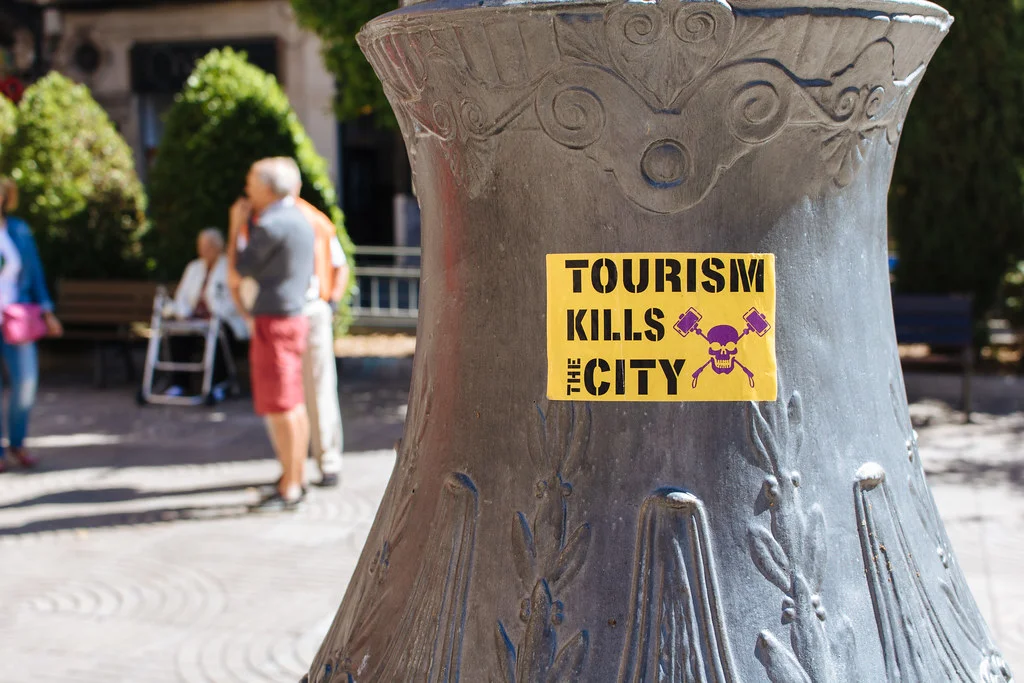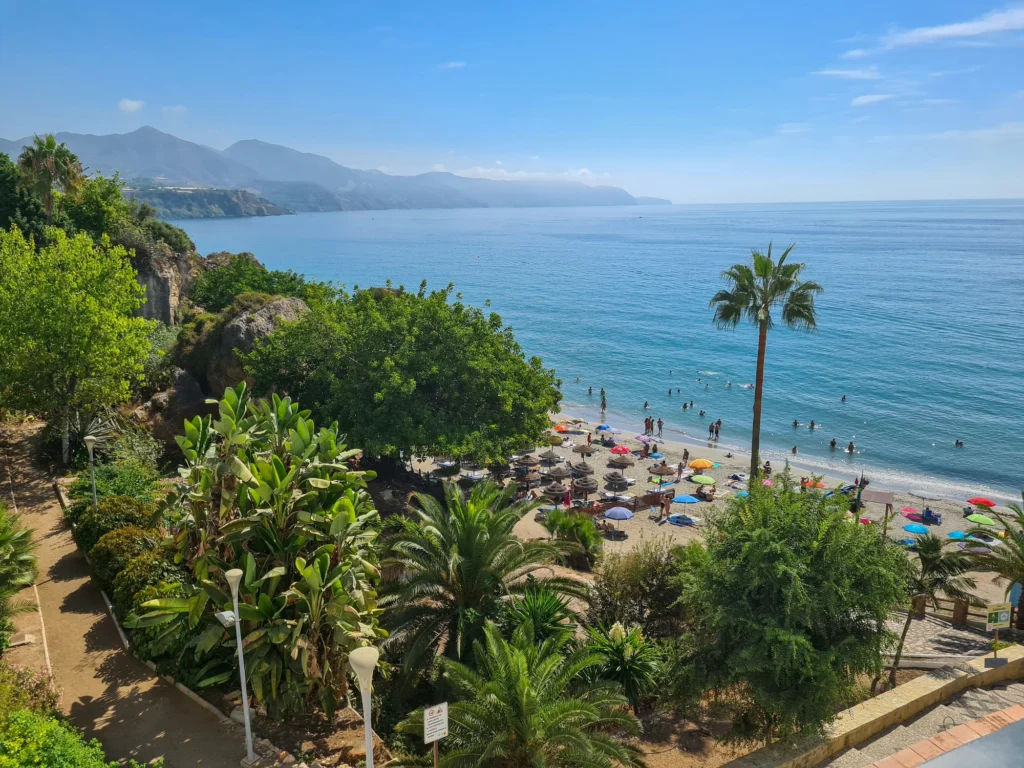Spain looks like a retirement paradise, right?
- Possibly the world’s best healthcare
- A cost of living that makes your retirement income stretch further
- Mediterranean sunshine
- Walkable cities
- Yes, jamón that will ruin you for average American deli meat forever
But under that postcard-perfect surface is a Spain most Americans never hear about until they’ve already moved: The red tape, the taxes, the cultural friction that no relocation brochure dares mention.
If you’re thinking about retiring in Spain, read this before you make the move. You can still live your dream life, absolutely. But you need to go in eyes wide open and understand both the pros and the cons.
Or watch the video here instead:
1. “Foreigners, Go Home”
Spain’s “anti-tourist” sentiment has gone viral. Protest signs, angry chants, headlines warning of an expat exodus. You may have seen this on the news a few months ago.
Here’s what’s really happening on the ground: Spaniards are angry about mass tourism and government mismanagement. They’re pissed off at the policies that allowed Barcelona, in particular, to be swarmed by misbehaving, disrespectful tourists.
They’re not necessarily concerned about those retiring in Spain who come to integrate into the local community and contribute to the Spanish economy. You are not the enemy – unless you act like one.
Do whatever you’d like. We’re not here to babysit you or tell you how to act abroad. That’s not our job. But if you want our recommendation, here it is:
Don’t treat Spain, or any foreign country for that matter, like Disneyland. Learn at least the basics of the local language. Shop local. Be a guest who then becomes part of the community.
The difference between welcome and rejection? It’s how you show up.
Despite these headlines, Spain remains one of the most immigrant-friendly countries in Europe. The non-lucrative visa, digital nomad visa, and Beckham tax law all exist for a reason: Because Spain wants you (nay, needs you) here as long.

2. Spain’s Healthcare is World-Class
Let’s talk about your future doctor visits: Spain’s healthcare system consistently ranks in the top 10 worldwide. It’s also one of the main reasons Americans retire in Spain and remain here for life.
Private insurance, which is often required for visa holders (including the digital nomad visa and non-lucrative visa) in Spain, runs as little as US$100 a month. You get quick appointments, slick facilities, great care, and some of the most qualified doctors in Europe.
Public healthcare? In the US, you might shiver at the idea. But in Spain, it’s free (or nearly free) once you qualify and high-quality. But of course, expect longer wait times and more bureaucracy.
Pre-existing conditions are typically not covered by private plans. You’ll need to access the public system for pre-existing condition care. To qualify for public healthcare in Spain, you must have at least one year of residency under your belt or qualify through a special program like Convenio Especial. We can cover this in a future article in the Freedom Files.
Bottom line: Get help choosing the right plan. It’s not rocket science, but it can feel like it if you’re navigating it alone. The Freedom Files expat relocation experts can assist you in the process.
3. Spain’s Bureaucracy Could Break You
Want to test your patience? Apply for anything in Spain.
I once waited three weeks for an appointment in Madrid, only to get … yes, another appointment. The clerk behind the desk smiled and said, “Vuelve en septiembre.” (Come back in September.) Not ideal when you’re an American with a breakneck work ethic.
Here’s what you need to know:
- It’s not malicious. It’s just inefficient.
- Missing one document can reset the entire process. Get your s*** in order first.
- You’ll often need copies of your copies – sometimes, of documents they never told you to bring in the first place.
What we’ve found works wonders for our expat clients in Spain is treating the bureaucracy like a game. Expect delays. Laugh when you can. And for the love of tapas, get help from someone who knows the system.

4. Mindblowing Cost of Living
If you’ve ever paid US$4,000 a month for rent in a Los Angeles shoebox or US$19 for a Whole Foods salad in New York City, welcome to redemption.
Here’s what US$2,000 a month can get you in a mid-sized Spanish city:
- A two-bedroom apartment
- Fresh, local produce that tastes like the almighty intended
- US$3 glasses of wine at lunch
- US$25 three-course meals
- And nights out that don’t bankrupt you
Spain isn’t “cheap,” especially in Madrid, Barcelona, or Marbella during tourist season. But it is incredible value. You pay less, and you get a heck of a lot more quality of life.
This is the reason Spain has ranked so high on expat destination lists for decades.
Just don’t move here expecting to stretch US$1,000 in a large, walkable, cosmopolitan Spanish city. This isn’t Thailand. But compared to the US? It’s magic.
5. Spanish Taxes Are a Minefield
This is the part where most Americans get wrecked. Yes, Spain’s top income tax rate can hit 47%. Add wealth tax (Spain is one of few European countries left with such a tax), inheritance tax, and regional quirks. Suddenly, that move to Spain may not be all that appetizing, especially if you’re of high-net-worth.
But if you plan ahead and put together the right components (more on this below), you can avoid a lot of damage.
Spain has a tax treaty with the US, which helps avoid double taxation. It also has the Beckham Law, which can slash your tax rate in half for six years if you qualify. It’s intended for those working in Spain on the digital nomad visa or other work visa, but we’ve found niche cases with some of our clients.
In Spain, you will need:
- A US tax preparer
- A Spanish tax advisor
- And possibly a cross-border financial planner
Don’t cheap out here. A US$300 consultation could save you US$30,000 in mistakes. I’ve seen it happen. Many times.
The Freedom Files can help you with planning your move to Spain, including those pesky taxes.

6. Visas Are Friendly – But Not Foolproof
Spain offers multiple ways in:
- Non-lucrative visa (for those retiring in Spain not working)
- Digital nomad visa (for remote workers and earners)
- Golden visa (defunct – ignore any content you see about this visa on other websites or content)
Each has pros and cons. The non-lucrative visa is great for retirees, but you’ll need private health insurance and enough income to support yourself (roughly €30,000 in savings). The digital nomad visa is for those who are still working and earning income outside of Spain.
And each of these visas has one thing in common: paperwork. Glorious, frustrating, endless paperwork.
Start the process 6 months before you move. You’ll thank yourself later when Spanish bureaucracy inevitably delays your plans.
7. Spain’s #1 Quality of Life in the World
Everything else is just friction points. But for many of our expat clients now happily living in Spain, they’re worth it. To them, life in Spain feels better.
You walk more. You sleep deeper. You eat slower. You connect with people again. Your cortisol drops, your weight drops, your stress drops.
And the taxes, the bureaucracy, the supposed anti-tourism strife. It doesn’t matter to them because their quality of life matters more.
This is why over 40,000 Americans now call Spain home and why it’s consistently on top of our clients’ wishlists for a dream retirement overseas. Not because it’s perfect but because it’s the beautiful life they’d always imagined in their golden years.

Is Retiring in Spain in Your Future?
Spain is a full-on messy, beautiful, complex, and worthwhile lifestyle shift for the right applicant. It has its pros, and it has its cons. Our only wish is for you to enter this phase of life with the whole picture, not just the rose-colored one told online.
So, should you retire in Spain? Check out our guide at that link to learn more about all pros and cons, the visa options at your disposal, the frequently asked questions we walk clients through, and anything else you may wonder about moving to the Iberian peninsula.
If that’s you, let’s talk. Or if you want to understand all your options in retirement, book a consult with our relocation experts here.


